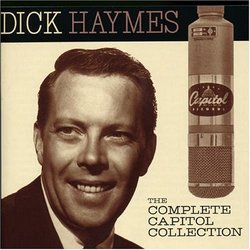| All Artists: Dick Haymes Title: Complete Capitol Collection Members Wishing: 2 Total Copies: 0 Label: Emd Int'l Release Date: 9/11/2006 Album Type: Import Genres: Jazz, Pop, Broadway & Vocalists Styles: Easy Listening, Vocal Pop Number of Discs: 2 SwapaCD Credits: 2 UPCs: 094637138922, 094637138953 |
Search - Dick Haymes :: Complete Capitol Collection
 | Dick Haymes Complete Capitol Collection Genres: Jazz, Pop, Broadway & Vocalists
|
Larger Image |
CD Details |
CD ReviewsFascinating addition E. C Goodstein | Northern CA United States | 09/12/2006 (5 out of 5 stars) "I think this collection is essential for Haymes's fans and probably worthwhile for anyone enjoying 'classic pop' vocals. These were recorded in the mid-50's and include two very fine albums, "Rain and Shine" and "Moondreams" as well as a few singles and a couple fascinating 'work in progress' outtakes. Those are of minor songs that he struggles with-- "Rainbow's End" and "My Love for Carmen' (an odd take off of the opera's "Habenera"). "Moondreams' esp. is a real gem IMO-- worthwhile on it's own. And if his voice is just a bit more ragged on "Rain and Shine" he still sings ballads so well. I also enjoyed the more 'upbeat' orchestrated songs by Gordon Jenkins, "Never Leave Me" and "New York's My Home." Many gems, including "How Deep is the Ocean," "Where or When," "What's New?", a slightly upbeat "Skylark' (interesting idea) and others. While his Decca work earlier may be more consistently wonderful, this is still great I think and so glad to see on CD finally." Some of the best ballad singing ever recorded Kevin J. Roberts | 02/16/2007 (5 out of 5 stars) "These are widely considered to be the finest recorded performances by one of the premier baritone popular singers ever. It is a shame that Dick Haymes did not have the opportunity to follow these recordings with even more. The statement in the other review that Haymes voice was "ragged" is a little bizarre, because most anyone listening would describe these performances as (I hate to use the word) "smooth". These recordings have only been available on high priced alternative editions from Japan and a rare out-of-print English edition. But this edition adds as a bonus all of Haymes various singles for Capitol (never on CD before, and all very rare in any form). If you enjoy Haymes, Sinatra's closest competitor, please try out the many various CDs put out by the Dick Haymes society, all available through Amazon, of live radio performances, studio transcriptions and other things, all good quality discs that will be rare collectables someday. This 2 cd edition is very special. If you like Sinatra's ballad records of the 50's on Capitol, get this too!!" Rediscovering an American Original Samuel Chell | Kenosha,, WI United States | 06/26/2007 (5 out of 5 stars) "A handsomely packaged, informative, well-documented and value-priced two-CD set comprising Haymes' major work for Capitol, viz. "Rain or Shine" and "Moon Dreams." As this collection demonstrates, Haymes--despite the turbulence within and about him--evidenced little if any damage to his voice, which retained its full, rich and vibrant sound until the very end. (I recall a stunning appearance by him on Johnny Carson's show in the '70s.) Rarely if ever could it be said that the voice sounded tired, rough, or even aging. However life treated him, he treated his instrument with the tenderness that it was capable of expressing, avoiding the sense of "strain" that accounted for the engaging tension in Sinatra's voice on one occasion, and the weathered and weary quality on another.
Some of Haymes' champions compare his vocal quality to Nat Cole's or Johnny Hartman's. I don't find it that velvety and luxuriant, as rich and expressive as it is. At first, a newcomer may notice a tightly spinning vibrato (also true of Doris Day, who is admittedly a wonderful singer) that may initially be distracting. On the "Moon Dreams" collection, it's leveled out, as he introduces the first two ballads--"If I Should Lose You" and "You Don't Know What Love Is"--with sotte voce dynamics, producing an intriguing and quiet intensity that grows on you, a marked contrast to the full-throated angst of Sinatra's readings of what he called "suicide songs." If he had received the same breaks in the '50s, there's sufficient evidence on the basis of this last major recording to suggest he might have produced sequels on the order of Sinatra's "In the Wee Small Hours," "No One Cares," "Only the Lonely," "Where Are You," "September of My Years," "Point of No Return," "Close to You" and "All Alone" (though the scarcity especially of these last two priceless sessions makes you wonder if the public is subjecting Sinatra to the same fate as Haymes). It's probably best to approach each singer as sui generis. Sinatra was "driven" to build operatic breath reserves and to take risks--in the length of his phrases, the pushing of both extremes of his range, and his bold approach to phonetic elocution (no softening of consonants, vowels or diphthongs)--and he admittedly falls short on occasions, or at least is uneven. Haymes views the ballad differently, is seeking a different effect, and employing a more conservative means to attain that effect. He sings with intelligence, unfaltering good taste, remarkable consistency, and a fullness, warmth and suppleness that were his alone. For a change, the inclusion of out-takes is a most welcome addition, giving the listener an insider's glimpse of the mentality of the recording industry in the '50s as well as of Haymes' congenial, forebearing personality." |

 Track Listings (20) - Disc #1
Track Listings (20) - Disc #1